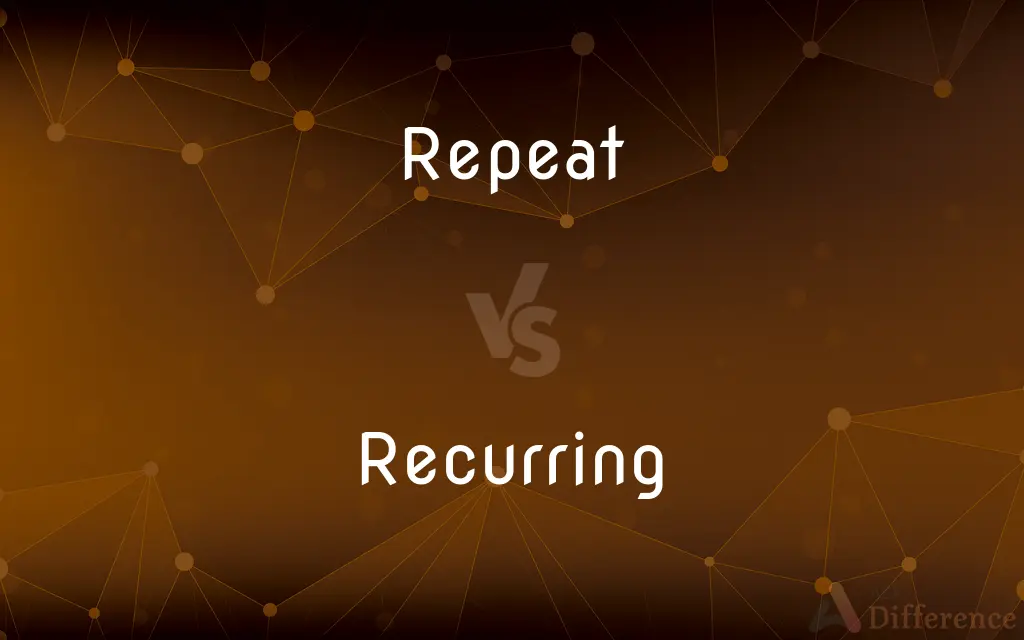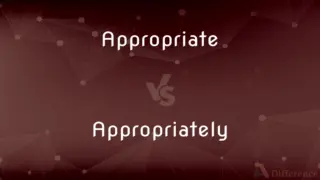Repeat vs. Recurring — What's the Difference?
Edited by Tayyaba Rehman — By Maham Liaqat — Updated on March 27, 2024
Repeat events are ones that happen again, often at irregular intervals or by choice, while recurring events follow a regular, predictable pattern.

Difference Between Repeat and Recurring
Table of Contents
ADVERTISEMENT
Key Differences
Repeat events can occur in various contexts, such as watching a favorite movie multiple times by choice or repeating a class to improve a grade. These events happen again but don't necessarily follow a predictable schedule. On the other hand, recurring events are those that occur at regular intervals, like annual conferences or monthly meetings, offering predictability and a set pattern in their occurrence.
In terms of planning, repeat events may require individual decision-making each time the event is to occur, considering factors like availability or desire. Recurring events, however, are typically scheduled in advance based on a regular timeline, such as weekly, monthly, or yearly, making them easier to anticipate and prepare for in both personal and professional calendars.
The concept of repetition can imply a range of frequencies and does not necessarily denote a consistent pattern, allowing for greater flexibility. For example, one might decide to repeat a workout routine whenever time permits. Conversely, recurring events are expected to happen at specific times, establishing a routine or tradition, such as Sunday family dinners or annual holiday gatherings, which reinforces their predictability.
Repeat events often offer the opportunity for variation each time they occur. For instance, repeating a vacation to the same destination might include different activities or experiences with each visit. In contrast, recurring events tend to maintain a consistent format or agenda, like a monthly book club meeting discussing a new book, which contributes to their reliability and stability over time.
The perception of repeat versus recurring events can also differ in terms of commitment and expectation. Participating in repeat events may be seen as more flexible, allowing individuals to opt in or out based on current circumstances. Recurring events, however, might carry an expectation of regular participation, as they are often integrated into a structured schedule, highlighting the difference in commitment level associated with each type of event.
ADVERTISEMENT
Comparison Chart
Frequency
Irregular or by choice
Regular, predictable intervals
Planning
Requires individual decision-making
Scheduled in advance, easy to plan
Flexibility
High, with potential for variation
Low, often follows a set pattern
Examples
Watching a movie again, retaking a class
Weekly meetings, annual conferences
Commitment Level
Flexible, based on desire or need
Expected, part of a routine
Compare with Definitions
Repeat
The act of doing something again.
The repeat of the experiment yielded the same results.
Recurring
Continuously coming back.
The recurring theme of the book highlights resilience.
Repeat
To do or perform again.
She decided to repeat the course next semester.
Recurring
To be repeated regularly.
Their annual vacation to Hawaii is a recurring event.
Repeat
Occurring again by choice or circumstance.
They chose to repeat their visit to the beach.
Recurring
Having a predictable return.
He deals with recurring expenses every month.
Repeat
A duplicate or another version.
The movie's sequel felt like a repeat of the first.
Recurring
Occurring again at intervals.
She noticed a recurring pattern in the data.
Repeat
To occur again in a similar fashion.
The issue seems to repeat itself every few months.
Recurring
Happening regularly or periodically.
The recurring meeting takes place every Tuesday.
Repeat
Say again something one has already said
‘Are you hurt?’ he repeated
Ann repeated that she was very comfortable
Billy repeated his question
Recurring
To happen or occur again or repeatedly
The pain recurred after eating.
Repeat
Do (something) again or more than once
Earlier experiments were repeated on a larger scale
Recurring
To return to one's attention or memory
The thought recurred to her late at night.
Repeat
(of food) be tasted intermittently for some time after being swallowed as a result of belching or indigestion
That cucumber repeated on me for hours
Recurring
To return in thought or discourse
He recurred to the subject right after dinner.
Repeat
Something that occurs or is done again
The final will be a repeat of last year
Recurring
(Archaic) To have recourse; resort
"When ... direct taxes are not necessary, they will not be recurred to" (James Madison).
Repeat
To say again
Could you repeat the question?.
Recurring
Present participle of recur
Repeat
To utter in duplication of another's utterance
Repeated the customer's complaint in disbelief.
Recurring
Happening or occurring frequently, with repetition.
He has recurring asthma attacks.
Revenge is a recurring theme in this novel.
Repeat
To recite from memory
Repeated the poem verbatim.
Recurring
(mathematics) Of a decimal: having a set of digits that is repeated indefinitely.
Every rational number can be written as either a terminating decimal or a recurring decimal.
Repeat
To tell to another
Repeated what he had heard that morning.
Recurring
A recurrence; a coming round again.
Repeat
To do, experience, or produce again
Repeat past successes.
Repeat a course.
Repeat a pattern.
Recurring
Coming back;
A revenant ghost
Repeat
To express (oneself) in the same way or words
Repeats himself constantly.
Repeat
To say something again.
Repeat
To do or experience something again, especially to win a championship for a second time in a row.
Repeat
To occur or happen again
The melody repeats in the refrain.
Repeat
To commit the fraudulent offense of voting more than once in a single election.
Repeat
An act of repeating.
Repeat
Something repeated, as an interval in athletic training.
Repeat
A broadcast of a television or radio program that has been previously broadcast; a rerun.
Repeat
A passage or section that is repeated.
Repeat
A sign usually consisting of two vertical dots, indicating a passage to be repeated.
Repeat
Of, relating to, or being something that repeats or is repeated
A repeat offender.
A repeat performance of the play.
Repeat
(transitive) To do or say again (and again).
The scientists repeated the experiment in order to confirm the result.
Repeat
To refill (a prescription).
Repeat
(intransitive) To happen again; recur.
Repeat
(transitive) To echo the words of (a person).
Repeat
(intransitive) To strike the hours, as a watch does.
Repeat
(obsolete) To make trial of again; to undergo or encounter again.
Repeat
To repay or refund (an excess received).
Repeat
To call in a previous artillery fire mission with the same ammunition and method either on the coordinates or adjusted either because destruction of the target was insufficient or missed.
Add 100, left 50. Repeat, over.
Use "say again" instead of repeat on the radio. Repeat will bring in artillery fire.
Repeat
To commit fraud in an election by voting more than once for the same candidate.
Repeat
An iteration; a repetition.
We gave up after the third repeat because it got boring.
Repeat
A television program shown after its initial presentation; a rerun.
Repeat
A refill of a prescription.
Repeat
A pattern of nucleic acids that occur in multiple copies throughout a genome (or of amino acids in a protein).
Repeat
(music) A mark in music notation directing a part to be repeated.
Repeat
To go over again; to attempt, do, make, or utter again; to iterate; to recite; as, to repeat an effort, an order, or a poem.
Not well conceived of God; who, though his powerCreation could repeat, yet would be lothUs to abolish.
Repeat
To make trial of again; to undergo or encounter again.
Repeat
To repay or refund (an excess received).
Repeat
The act of repeating; repetition.
Repeat
That which is repeated; as, the repeat of a pattern; that is, the repetition of the engraved figure on a roller by which an impression is produced (as in calico printing, etc.).
Repeat
A mark, or series of dots, placed before and after, or often only at the end of, a passage to be repeated in performance.
Repeat
An event that repeats;
The events today were a repeat of yesterday's
Repeat
To say, state, or perform again;
She kept reiterating her request
Repeat
Make or do or perform again;
He could never replicate his brilliant performance of the magic trick
Repeat
Happen or occur again;
This is a recurring story
Repeat
To say again or imitate;
Followers echoing the cries of their leaders
Repeat
Do over;
They would like to take it over again
Repeat
Repeat an earlier theme of a composition
Common Curiosities
What distinguishes a repeat event from a recurring one?
Repeat events occur again, possibly irregularly or by choice, whereas recurring events follow a regular, predictable pattern.
Can an event start as a repeat and become recurring?
Yes, an event initially repeated by choice can become scheduled regularly, thus becoming a recurring event.
Are recurring events always predictable?
Yes, by definition, recurring events happen at predictable intervals, contributing to their reliability.
How does planning differ for repeat vs. recurring events?
Repeat events require individual planning each time, while recurring events are scheduled in advance and expected to occur regularly.
Is flexibility more associated with repeat or recurring events?
Flexibility is more associated with repeat events due to the irregularity and personal choice involved in their occurrence.
How do repeat and recurring events impact time management?
Repeat events require more ad-hoc planning, while recurring events can be efficiently integrated into long-term schedules.
Do recurring events require a higher level of commitment?
Yes, recurring events generally carry an expectation of regular participation and are often integrated into structured schedules.
How do cultural or social norms influence the perception of these events?
Cultural and social norms can shape the importance and expectation of participation in both repeat and recurring events.
Can a recurring event change its frequency?
While the frequency of a recurring event can change, it typically maintains a regular pattern once established.
How do repeat and recurring events affect personal relationships?
They can strengthen relationships through shared experiences, with recurring events often establishing a consistent base for interaction.
What factors might cause a recurring event to end?
Changes in interests, availability, or circumstances can lead to the discontinuation of a recurring event.
How do repeat and recurring events contribute to a sense of community?
They foster connections and a sense of belonging by bringing people together either sporadically (repeat) or regularly (recurring).
Can both repeat and recurring events be beneficial?
Yes, both can offer benefits, with repeat events providing flexibility and recurring events offering stability and routine.
What role does technology play in managing these types of events?
Technology, like digital calendars and reminders, aids in tracking and planning both repeat and recurring events effectively.
Can an event be both repeat and recurring?
An event can have aspects of both if it happens regularly but also involves elements of choice or variation each time.
Share Your Discovery

Previous Comparison
Rasher vs. Bacon
Next Comparison
Appropriate vs. AppropriatelyAuthor Spotlight
Written by
Maham LiaqatEdited by
Tayyaba RehmanTayyaba Rehman is a distinguished writer, currently serving as a primary contributor to askdifference.com. As a researcher in semantics and etymology, Tayyaba's passion for the complexity of languages and their distinctions has found a perfect home on the platform. Tayyaba delves into the intricacies of language, distinguishing between commonly confused words and phrases, thereby providing clarity for readers worldwide.
















































